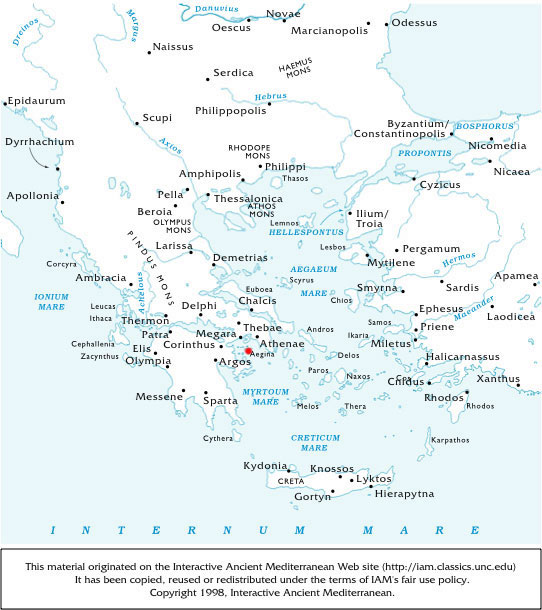An island in the Sinus Saronicus, near the coast of Argolis. The earliest accounts given by the Greeks make it to have been originally uninhabited, and to have been called, while in this state, by the name of Oenoné; for such is evidently the meaning of the fable, which states that Zeus, in order to gratify Aeacus, who was alone there, changed a swarm of ants into men, and thus peopled the island (Pausan. ii, 29, and Apollod.iii. xii. 7). It afterwards took the name of Aegina, from the daughter of the Asopus. But, whoever may have been the earliest settlers on the island, it is evident that its stony and unproductive soil must have driven them at an early period to engage in maritime affairs. Hence they are said to have been the first who coined money for the purpose of commerce, and [p. 23] used regular measures, a tradition which, though no doubt untrue, still points very clearly to their early commercial habits. (See Numismatics.) It is more than probable that their commercial relations caused the people of Aegina to be increased by colonies from abroad, and Strabo expressly mentions Cretans among the foreign inhabitants who had settled there. After the return of the Heraclidae, this island received a Dorian colony from Epidaurus (Pausan. ii. 29), and from this period the Dorians gradually gained the ascendency in it, until at last it became entirely Doric, both in language and form of government.Aegina, for a time, was the maritime rival of Athens, and the competition eventually terminated in open hostilities, in which the Athenians were only able to obtain advantages by the aid of the Corinthians, and by means of intestine divisions among their opponents (Herod.viii. 46, and v. 83).
When Darius sent deputies into Greece to demand earth and water, the people of Aegina, partly from hatred towards the Athenians, and partly from a wish to protect their extensive commerce along the coasts of the Persian monarchy, gave these tokens of submission (Herod.vi. 49). For this conduct they were punished by the Spartans. In the war with Xerxes, therefore, they sided with their countrymen, and acted so brave a part in the battle of Salamis as to be able to contest the prize of valour with the Athenians themselves, and to bear it off, as well by the universal suffrages of the confederate Greeks (Herod.viii. 93) as by the declaration of the Pythian oracle. After the termination of the Persian war, however, the strength of Athens proved too great for them. Their fleet of seventy sail was annihilated in a sea-fight by Pericles, and many of the inhabitants were driven from the island, while the remainder were reduced to the condition of tributaries. The fugitives settled at Thyrea in Cynuria, under the protection of Sparta, and it was not until after the battle of Aegospotamos, and the fall of Athens, that they were able to regain possession of their native island (Hist. Gr. ii. 2, 5). They never attained, however, to their former prosperity. The situation of Aegina made it subsequently a prize for each succeeding conqueror, until at last it totally disappeared from history.
In modern times the island nearly retains its ancient name, being called Aegina or, with a slight corruption, Engia, and is often visited by travellers, being beautiful, fertile, and well cultivated. As far back as the time of Pausanias, the ancient city would appear to have been in ruins. That writer makes mention of some temples that were standing, and of the large theatre built after the model of that in Epidaurus. The most remarkable remnant of antiquity which this island can boast of at the present day is the Temple of Pallas Athené, situated on a mount of the same name, about four hours' distance from the port, and which is supposed to be one of the most ancient temples in Greece, and one of the oldest specimens of the Doric style of architecture. See Aeginetan Sculptures. (Harpers Dictionary of Classical Antiquities, 1898)
